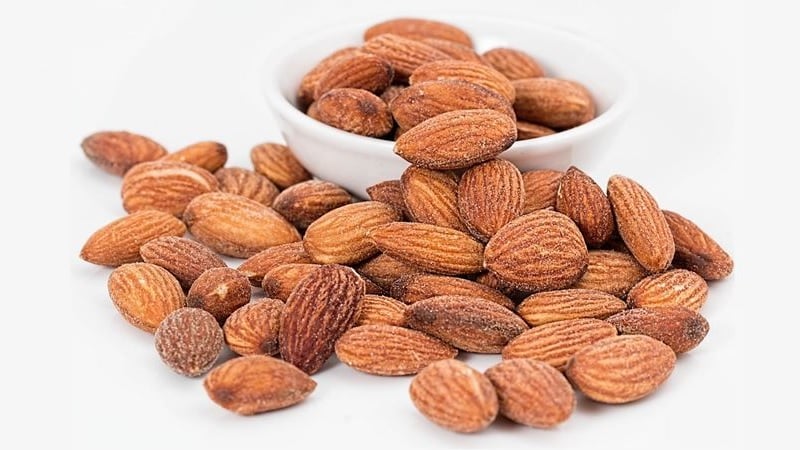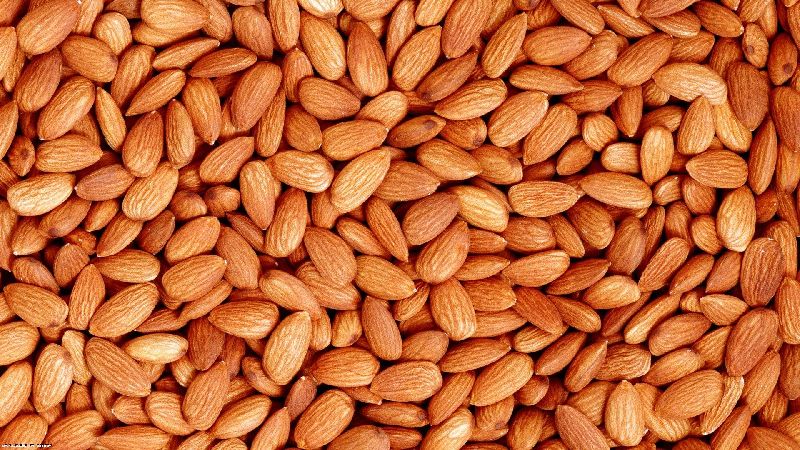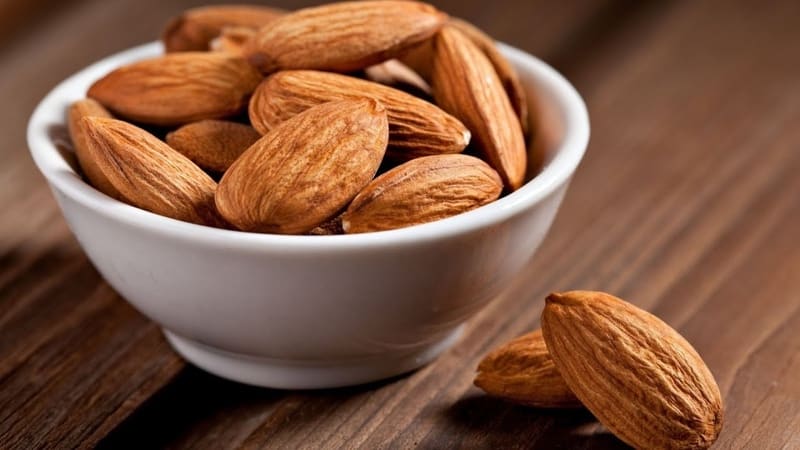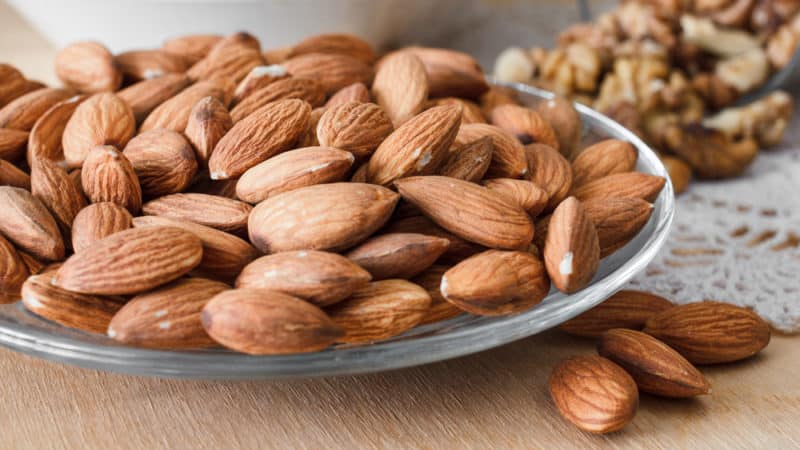Where and how to store almonds at home, peeled and in shell
Almonds are a popular nut with a pleasant taste and light aroma. It contains many useful substances, valuable fats and is widely used in cooking. It is eaten without pre-processing and used as an addition to salads, main courses and desserts. They even make flour from it, which is an excellent substitute for wheat.
Almonds are not cheap, so it is important to know how to store them at home in peeled and unpeeled form so that they do not spoil ahead of time.
Almond selection

To ensure that your almonds have the longest possible shelf life, it is important to make the right choice when purchasing nuts. Pay attention to the following parameters:
- Shape and size. The nuts should have the correct drop-shaped shape, which resembles sunflower seeds. It is important that all nuts are the same size. This suggests that they were collected at the same time.
- Appearance. The color should be uniform, without rust, mold or other spots or holes that indicate insect damage.
- Smell. A light, specific almond aroma indicates the freshness of the product. A bitter, rancid smell is a sign of spoilage.
- Humidity. The almonds should be dry, but not dry. It is important that the kernels are not damp. This is checked by biting a nut. If it is too hard but not crispy, it is too dry. If it is soft and stringy, it means the product is damp.
- The shell. It should be hard, uniform in color, without stains, chips or other damage.
Nuts in the shell have a longer shelf life. Therefore, this type of almond is chosen for long-term storage.
Advice! Almond By weight it is cheaper than an already packaged product, and it is easier to check its quality.
Preparation for storage

Almonds do not require special preparation for storage. All you need to do is go through them, eliminating all damaged and low-quality specimens, as well as foreign impurities.
Despite the fact that shelled almonds are stored longer, some housewives prefer to clear part of their stock in advance. After all, it is in this form that the product is easier to use for cooking.
The hard shell is opened using a nut cracker or a small hammer. It is important to use the tool carefully so as not to damage the core.
You can peel the brown film from almonds in different ways. One option is to pour boiling water over the nuts. After this, the film will easily separate from the core.
Raw almonds last longer than roasted almonds. Some housewives still dry it.
Advice! Almonds are dried in an electric dryer, microwave, frying pan, oven or in the fresh air in a natural way. The latter option allows you to save more nutrients.
Storing Unshelled Nuts

Almonds in the shell last the longest. The hard shell protects the core from negative environmental factors, bacteria and insects, and prevents it from oxidizing in the air. It is recommended to purchase it for long-term storage in an apartment.
Before storing fresh almonds in shell, it is important to create optimal conditions for them. The room should be dry. It is advisable that the place be cool. A pantry or cabinet under the windowsill is best.If there are no such premises, nuts are stored as far as possible from the stove.
Containers for shelled almonds must allow air to pass through. Otherwise, the product will become damp. Housewives use cardboard and wooden boxes, fabric bags, and paper bags. Polyethylene and hermetically sealed plastic or glass containers are not suitable.
The place where almonds are stored should be protected from direct sunlight. Ultraviolet radiation destroys some compounds in the product, making it less useful.
Do not allow moisture to get into the container with nuts. This will cause mold and premature spoilage of the product.
This is interesting:
A selection of the best varieties of cabbage for pickling and storing for the winter
The benefits and harms of orange peels, rules for their preparation, storage and use
Storing Shelled Almonds

It is recommended to store peeled young almonds in a brown shell (film). Clean it immediately before use. It also protects the product from oxidation, extending its shelf life.
There are several ways to store peeled almond kernels. Each of them has its own nuances.
At room temperature
Young almonds have the shortest shelf life at room temperature. It quickly becomes saturated with moisture, acquires a rancid taste and loses its aroma.
To minimize environmental impact and extend the shelf life of the product, it is placed in the pantry or on the bottom shelf of the kitchen unit.
Kernels are stored longest in vacuum packaging. Often nuts are sold in this form. There are special forms, as well as vacuum sealers for independent use at home.
If you bought almonds by weight and there is no way to vacuum them at home, the nuts are placed in a clean, dry jar, which is hermetically sealed. It is not recommended to put almonds in metal cans, which accelerate their oxidation.
In a refrigerator
Almonds are best stored in the refrigerator. There the temperature is low, which allows you to extend the shelf life.
There are other products in the refrigerator compartment. If stored improperly, their odors mix, which negatively affects the taste. To prevent this from happening, the almonds are placed in the vegetable drawer. It is pre-packed in a plastic bag or plastic tray. Unpeeled vegetables and fruits are placed nearby, but not garlic and onions.
Water often accumulates in vegetable drawers. It is important to protect the nuts from liquids. If moisture does penetrate under the packaging, the almond kernels will have to be eaten within 1-2 days. Otherwise, they will become unfit for consumption.
Note! Almonds should not be stored in the refrigerator if condensation runs down its walls and ends up in the vegetable drawers.
If for some reason storing nuts in the refrigerator is impossible, in winter they are placed on a glazed balcony. They will stay there no less.
In the freezer
Nuts last the longest in the freezer. At the same time, they do not lose their beneficial properties. Their taste also does not change significantly.
Almond kernels are placed in a bag or plastic tray and placed in the freezer. It is advisable that nuts, meat and fish are on different shelves.
Important! If almonds have been thawed, they cannot be re-frozen.
Storing Green Almonds
Green almonds are rarely found on store shelves.If you managed to purchase this healthy and tasty product, it is important to ensure proper storage.
Typically, young green almonds are stored in the refrigerator, preferably in vacuum packaging. If this is not possible, the almonds are placed in a hermetically sealed plastic container or plastic bag. Store the product in vegetable boxes.
Some housewives freeze green almonds. It is pre-packed in a plastic bag or vacuum.
Important! There should not be a drop of liquid on the green nut shell. Otherwise, the product will begin to mold and rot.
Optimal storage conditions

Optimal storage conditions depend on whether the almonds were purchased in shell or without. The list shows the main indicators:
- Humidity. The maximum humidity for shelled and unshelled nuts is 75%. If the indicators are higher, the nuts will become moldy and acquire a rancid smell.
- Temperature. For inshell nuts, the optimal values are +16…+18°C. Temperatures suitable for peeled kernels are +4…+10°C.
- Lighting. Almonds are stored in a dry, dark place. The sun's rays destroy some of the beneficial substances in the product.
Best before date
How long almonds can be stored depends on their type and storage method:
- peeled kernels in the refrigerator – six months;
- the product remains in the freezer without changing its taste or chemical composition for up to a year;
- at room temperature, kernels without shells are stored for no more than 2 months;
- Unshelled almonds, if stored properly, will not spoil for 12 months.
Spoiled almonds have a rancid odor and unpleasant taste. Over time, the beneficial substances in it are destroyed. Eating spoiled food is dangerous to health.
Note! When purchasing packaged almonds, be guided by the expiration dates indicated by the manufacturer.
Tips for storing almonds at home
To keep almonds longer, several nuances are taken into account:
- After opening the vacuum packaging, the kernels are transferred to a clean, dry container - a glass jar or plastic food tray. The container must be sealed tightly.
- Almond petals, as well as crushed kernels, have a shorter shelf life than whole nuts. Their shelf life is 2-4 weeks.
- Different nuts have different tastes and aroma. Moreover, they all contain a large amount of oil. If you store them together, the flavors will mix, so keep almonds separate from other nuts.
- Cleaned kernels should not be allowed to come into contact with other products, especially spices. Otherwise, they will become saturated with foreign aromas.
Read also:
Is it possible to eat almonds on a weight loss diet?
Conclusion
Almonds are a healthy and tasty nut that is widely used in cooking and is used in many recipes. Its cost is very high, so it is so important to store it correctly.
For peeled and unpeeled kernels, storage conditions and shelf life will be different. In the first case, the product will not spoil at room temperature, but in the second it must be placed in the cold.